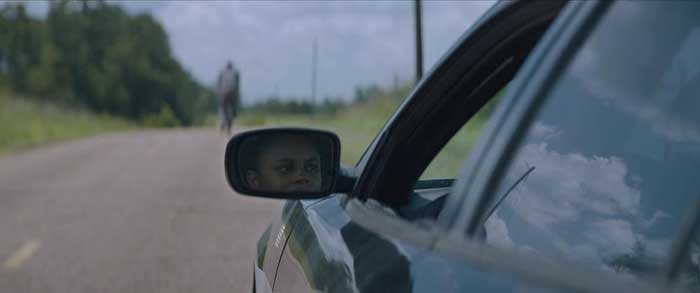|
Corrupt
police are a major plot
device in two excellent
but very different
films on Netflix.
In Jeremy Saulnier's Rebel Ridge, police
corruption is the whole
point, with two
innocent protagonists
fighting the campaign
by a vindictive
small-town police chief
to destroy them.
Conversely, Richard
Linklater's Hit Man features
only one corrupt cop
who is the nemesis of
the hero, a civilian
volunteer in the New
Orleans Police
Department who goes
undercover to foil
murder-for-hire plots.
If you're one of
the too few people who
saw Linklater's 2011
film Bernie, you'll
have an inkling of what
to expect.
Rebel Ridge begins
with a scene combining
two of the most
egregious examples of
police
misconduct—racial
profiling and civil
asset forfeiture.
Terry Richmond (Aaron
Pierre), a young Black
ex-Marine, is riding
his bike into the small
Southern town of Shelby
Springs. He has
his headphones on, so
he doesn't hear the
police car cruising
behind him. The
car rams Richmond's
bike, knocking him to
the ground. The
cops cuff and search
him, finding a plastic
bag containing $36,000
in cash. Richmond
explains that $10,000
is to bail his cousin
out of jail, and the
rest is to buy a
truck. The cops
inform him that large
amounts of cash are
automatically assumed
to be the proceeds of a
drug deal, and the cash
is subject to
confiscation.
Richmond heads on to
Shelby Springs to get
his money back.
The only person
inclined to help him is
Summer McBride
(AnnaSophia Robb), a
young courthouse
clerk. Getting
the money back quickly
is urgent; Richmond's
cousin is about to be
transferred to state
prison, where, as a mob
informant, he will
almost certainly be
killed.

Richmond goes to the police station to report the money as
stolen; there, he is confronted by one of the cops who rousted him
and by Police Chief Sandy Burnne (Don Johnson). From there,
the plot twists come thick and fast, as does the violence, and no
fair to reveal any of it. What must be noted is that Rebel Ridge is
a prime example of a man-against-the-system thriller—or, more
precisely, a man and woman against the system. What at first
appears to be good-ol'-boy racism and greed turns out to be
something even worse, which Summer—who knows where the
thumb drives are hidden—can prove. How Chief Burnne and his
mostly corrupt force come after Richmond and Summer—and
how Richmond and Summer fight back—comprise the entire
story, and it never lets up until the last few seconds.
Rebel Ridge offers nothing new in the way of plot, but it is
riveting, and it gains power by stressing how completely alone
Richmond and Summer are. There's plenty of mayhem in the
movie, but Richmond isn't Rambo; he's a former USMC martial
arts instructor, and while he's much more of a handful than
Burnne and his cronies expected, his survival depends on his wits
rather than his firepower. Complicating his survival is his need to
protect Summer, who—without going into detail—has severe
vulnerabilities that Burnne is all too ready to exploit.
If Rebel Ridge begins with a man riding a bicycle, Hit Man begins
with a man teaching a class. Gary Johnson (Glen Powell), a
professor of psychology and philosophy at the University of New
Orleans, is lecturing his students about Nietzsche's idea that the
greatest enjoyment is to live dangerously.
"Says the guy driving a Civic," one of his students whispers to
another.

Gary is divorced, living alone with his cats, devoted to
birdwatching. But he is also a whiz at technology, and he
moonlights with the police on sting operations, mostly involving
murder-for-hire plots. One day he is waiting in a surveillance van
with detectives Claudette (Retta) and Phil (Sanjay Rao) when the
word comes down: Jasper (Austin Amelio), the cop who
specializes in playing fake hit men, has been suspended for
beating up teenagers. The suspect—a tough customer with a long
rap sheet—is already at the meeting place, waiting for "Billy," the
hit man he is expecting. Claudette and Phil can't fill in for Jasper,
so Gary must play Billy.
Gary turns out to be surprisingly adept at playing a hit man, so
Claudette and Phil elect him to play one all the time. (Among
other things, Claudette and Phil are delighted not to deal with
Jasper, who is, as Claudette notes, "a dick.") Gary's training as a
psychologist gives him insight into the pathological human types
he deals with, and he is brilliant at creating personae and
disguises for himself. Gary's disguises are a hoot, as are the losers
and chuckleheads who comprise his would-be clientele.
"People are almost disappointed to learn that hit men don't really
exist," he says, But some, he adds, have a burning desire to get rid
of people who are dragging down their lives. Young and old, male
and female, rich and poor, they seek someone who can solve their
problems, and Gary strives to be the hit men they imagine.
Gary is trying out a new persona—that of sexy, mysterious
"Ron"—when he takes a meeting with a new suspect. She is
Madison (Adria Arjona), a disarmingly beautiful woman who
wants to put a hit on her abusive, drug-addled husband Ray
(Evan Holtzman). Gary is attracted to, and touched by, Madison.
Much to Claudette and Phil's consternation, he advises her to take
the money she would pay to kill Ray and start a new life with it.

When Madison and Gary meet again—Madison still thinking that
Gary is Ron—they begin, to put it mildly, a relationship. Gary gets
much better sex as Ron than he ever did as himself, but his tryst
with Madison begins a crazy chain of events which culminates in a
client trying to pay Gary to kill himself. Jasper, meanwhile,
senses something amiss, and zeroes in on Gary and Madison.
Gary Johnson was a real person, the subject of a magazine article
by Skip Hollandsworth—the same writer who profiled Bernie
Tiede, the murderer whose story formed the basis for Bernie.
Linklater and Powell wrote the screenplay for Hit Man based on
Hollandsworth's article, and Hit Man shares with Bernie the same
indulgent attitude toward people who feel the need to rid
themselves of inconvenient others. Viewers will be relieved to
learn that Hit Man is only a "somewhat true" story, whereas Bernie was totally accurate.
Hit Man is as crooked as Rebel Ridge is straightforward, but Hit
Man is crooked in a good way—at least I hope audiences will
agree with me on that. The laid-back charm of the story and the
cast, especially Powell, goes a long way toward selling what might
otherwise be a dodgy conclusion. In a way Hit Man is like The
Maltese Falcon if Bogart had played the sap for Mary Astor, or Double Indemnity if Edward G. Robinson had been the villain. It
especially resembles another film set in New Orleans—The Big
Easy, Jim McBride's underrated 1986 thriller-romance, in which
Dennis Quaid and Ellen Barkin steam up the screen as
authoritatively as Powell and Arjona do in Hit Man. Quaid and
Barkin's characters, however, have a more traditional way of
dealing with police corruption than Gary and Madison.
See Rebel Ridge if you're looking for a straight-up action thriller
with a social conscience, Hit Man if you're seeking a quirky, crime
-themed romcom with a black comic edge. And remember: all pie
is good pie.
|